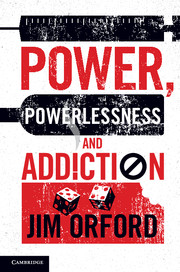Book contents
- Frontmatter
- Dedication
- Contents
- Preface
- Acknowledgements
- 1 Powerful connections
- 2 How addiction erodes free agency
- 3 Addiction subordinates the interests of family members and friends
- 4 Inequality in the power to resist addiction
- 5 Power and powerlessness in the addiction supply industries
- 6 Reasserting control and power in the process of change and treatment
- 7 Facing up to the power of addiction and those who benefit from it
- References
- Index
7 - Facing up to the power of addiction and those who benefit from it
Published online by Cambridge University Press: 05 July 2013
- Frontmatter
- Dedication
- Contents
- Preface
- Acknowledgements
- 1 Powerful connections
- 2 How addiction erodes free agency
- 3 Addiction subordinates the interests of family members and friends
- 4 Inequality in the power to resist addiction
- 5 Power and powerlessness in the addiction supply industries
- 6 Reasserting control and power in the process of change and treatment
- 7 Facing up to the power of addiction and those who benefit from it
- References
- Index
Summary
The exercise of power is present at every turn in the attempt to understand addiction. That is what I have tried to show in this book. Sometimes the operation of power is brutal and unmistakable. Those whose lives are threatened because they know too much about the illicit drug trade from which they seek to escape know well that sort of power (Chin 2009). Family members subject to frightening intimidation on account of the unpaid debts owed by their addicted relatives come face-to-face with it (O’Leary 2009). Those who are themselves addicted and homeless meet it regularly in the form of harassment, often violent, from police and the public (Rhodes et al. 2005). There are many other examples. But what is equally clear, as those who have theorised about power more generally have told us, is that power is a multifaceted thing (Clegg 1989; Lukes 2005). Naked coercion of a violent or threatening kind is only one of its faces. In many of its guises it shows us an apparently and often misleadingly more benevolent face. Reward power constitutes the clearest example.
In cases of addiction, is free will undermined, sovereignty forfeited, responsibility diminished?
The most obvious application of reward power lies in the inherent rewarding properties of those substances and activities which have addiction potential by virtue of their mood- or mind-altering capacities. Many object to the idea of such a property being inherent in a drug or in an activity such as gambling, preferring to emphasise the contribution made by people's beliefs and expectations, the circumstances in which consumption takes place, and society's attitudes towards particular forms of consumption (Zinberg 1978). Whatever the mix, it is an important part of the present argument that the experiences of drinking, taking certain drugs and engaging in certain forms of gambling were, for David, Amanda and Caroline respectively (see Chapter 1), highly rewarding, at least in the earlier stages of their careers of consumption before the costs of that consumption began to accumulate and their habits became mixed blessings and the source of serious conflicts of interests.
- Type
- Chapter
- Information
- Power, Powerlessness and Addiction , pp. 193 - 232Publisher: Cambridge University PressPrint publication year: 2013



